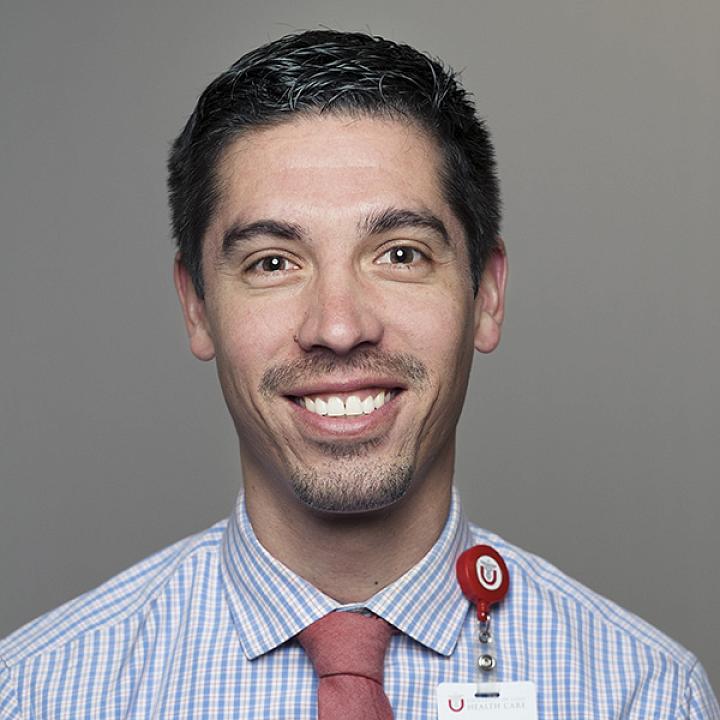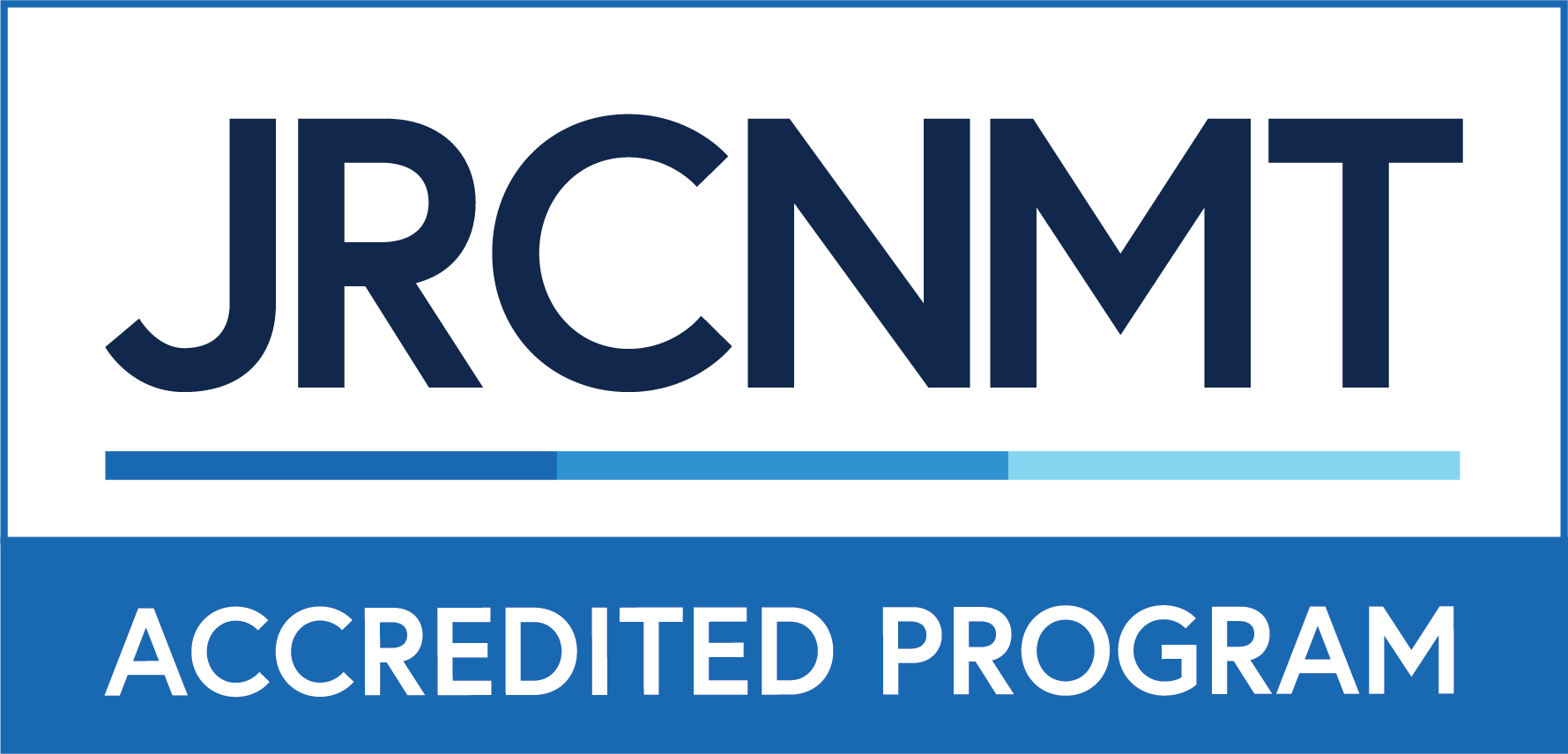
Nuclear Medicine Technologist Program
On This Page
What is nuclear medicine?
Nuclear medicine provides information to physicians about both the structure and (most importantly) the function of the human body. Nuclear medicine is unique and broad term that includes nuclear medicine imaging, PET/CT, and other molecular procedures. The techniques are safe, painless, and cost-effective. Nuclear medicine is a way to gather medical information that would otherwise be unavailable, require surgery, or require more expensive diagnostic tests. Nuclear medicine combines computer technology, advanced medical instrumentation, chemistry, physics, and radioactivity to diagnose and treat disease.
What are the responsibilities of a nuclear medicine technologist?
A Nuclear Medicine Technologist is a highly specialized healthcare professional who works closely with the nuclear medicine physician. Some of the technologist's responsibilities are to:
- Prepare and administer radioactive chemical compounds, known as radiopharmaceuticals.
- Perform patient imaging procedures using sophisticated radiation-detecting instrumentation.
- Accomplish computer processing and image enhancement.
- Analyze biologic specimens in the laboratory.
- Provide images, data analysis, and patient information to the physician for diagnostic interpretation. During an imaging procedure, the technologist works directly with the patient.
- Gains the patients confidence by obtaining pertinent history, describing the procedure and answering any questions.
- Monitors the patients physical condition during the course of the procedure.
- Notes any specific patient comments which might indicate the need for additional images or might be useful to the physician in interpreting the results of the procedure.
How Can I Become a Nuclear Medicine Technologist?
Our program is an accredited nuclear medicine technology (NMT) program that includes CT certification. The program currently holds a seven-year accreditation status with the Joint Review Committee on Education in Nuclear Medicine Technology (JRCNMT-2017). Two academic options are available for studying NMT at the University, the Certificate Course of Study and the BS in Health Education and Promotion with Emphasis in Nuclear Medicine Technology. The application deadline for both options is the second Friday of January each year. The NMT program officially starts summer semester.
Nuclear Medicine Technologist Program Overview
The Certificate course of study is an option for students who already have earned a BS degree. The certificate applicant must complete all prerequisite courses and submit a formal application to the Department of Radiology. Final applicants will be selected for an in-person interview and a shadow experience. Students who are selected will be required to complete all of the NMT Required Content Classes. At the completion of this course of study, the student will earn a Certificate of Completion in NMT and Computerized Tomography (CT) and be eligible to sit for the NMT and CT certification examinations (NMTCB and/or ARRT).
Certificate Course of Study
Nuclear Medicine Technologist Program is offered in both a certificate format and an academic partnership with the University of Utah Department of Health and Kinesiology (HK). For students completing a bachelor of science (BS) degree in health education, nuclear medicine technology is an emphasis option. For students who have already completed a bachelor's degree, a certificate program in nuclear medicine technology is offered.
Nuclear medicine technology training experiences occur at University Hospital, the Huntsman Cancer Hospital, the VA Medical Center, the Radiopharmacy and Primary Children's Hospital (minor rotation). Program faculty are radiologists, physicists, radiopharmaceutical experts and experienced technologists. The sponsoring institution and the affiliate institutions offer clinical experiences designed with a competency-based clinical educational system. All of the clinical affiliates offer a wide variety of patients, examinations and state-of-the-art equipment. The clinical experience does include PET/CT.
BS in Health and Kinesiology (HK) with Emphasis in Nuclear Medicine Technology (NMT)
The nuclear medicine technology emphasis is structured for students who do NOT have a BS degree. Upon completion of the NMT emphasis, the student will earn a BS in HK with Emphasis in NMT and be qualified to take the national NMT and CT certification exams. Emphasis students will also receive certificates of completion. This educational opportunity has been made possible due to an academic agreement between the Department of Radiology and the HK Department of the University of Utah.
The emphasis applicant must complete all prerequisite courses and submit a formal application to the Department or Radiology. Final applicants will be selected for an in-person interview. Emphasis applicants have Health Education courses to complete in addition to the nuclear medicine program prerequisites and must be declared as a HK major.
An admissions committee from NMT program representatives will interview and select students based on their perceived ability to successfully complete the program and become competent and compassionate NMT's. If the emphasis applicant is selected he/she will become a declared NMT Emphasis student within the HK department.
Radiologic Technologists RT (R)
Applicants who hold an Associates of Science Degree (AS) should pursue the NMT emphasis option. RT(R)'s are required to complete all pre-requisites required of the NMT emphasis student; however, some courses may be waived due to the applicants professional standing. RT(R)'s should schedule an appointment with the HK advisor and Otto Casal, the Education Director at 801-585-6753.
Certified Nuclear Medicine Technologists (NMTCB and/or ARRT)
Applicants who are NMTCB and/or ARRT certified are also eligible to complete the BS degree in H EDU with Emphasis in Nuclear Medicine Technology. The certified technologist must establish a time to meet with Otto Casal (otto.casal@hsc.utah.edu) and discuss their past NMT course of study. The required NMT content courses may be waived for the certified NMT, allowing the student to complete all other requirements of the HK degree.
The annual maximum student capacity will not exceed six (6) students from both the emphasis and certificate applicants. This does not include certified NMT's completing requirements for the baccalaureate degree. A minimum of two HK qualified applicants will be selected from the pool each year. The required content of the NMT program is structured to be completed in four semesters, which equates to 16 months. The accepted student will dedicate three (3) semesters or 12 months to the NMT curriculum and the final 4 months to the dedicated CT curriculum. Program officials can reduce the number of students accepted each year based on employment outlook and program effectiveness. Six students were accepted for the 2023-24 class.
Students who wish to pursue the HK BS with an emphasis in NMT may declare the HK major at any time. Students will not be allowed to choose the NMT Emphasis until they are accepted into the program.
Apply Now
Our Technologist Education Programs are in high demand and are competitive. We encourage you to apply and will walk you through the process.
Program Statistics
Graduate achievement data is an indicator of program effectiveness, demonstrating the extent to which a program achieves its goals. The current report on graduate achievement data, identified by program, is available on the JRCNMT website by clicking on the following link:
2018 Nuclear Medicine Program Outcome Statistics

